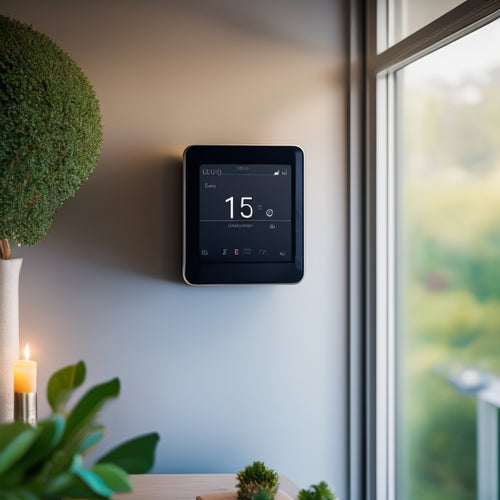
Why Home EV Charging Beats Public: Cost Analysis
Share
When you charge your electric vehicle at home, you can save up to 50% on charging costs compared to public stations. Home charging allows you to take advantage of lower electricity rates, especially during off-peak hours, and gives you more control over your energy usage. You'll also avoid hidden public charging fees, such as connection charges, idle fees, and membership premiums. Plus, home charging station installation costs are relatively low, and maintenance expenses are minimal. By understanding regional electricity rates, time-of-use pricing, and government incentives, you can optimize your home charging setup for even greater long-term savings - and that's just the beginning of the cost benefits you'll uncover.
Key Takeaways
- Home EV charging offers better cost control and lower operating expenses due to lower electricity rates and flexible charging schedules.
- Public charging stations incur hidden fees, including connection charges, idle fees, and membership fees, adding to overall costs.
- Home charging installation costs are relatively low, ranging from $500 to $1,000, and can be offset by tax credits.
- Regional electricity rates and time-of-use pricing plans significantly impact home EV charging costs, making it essential to understand local rates.
- Electric vehicles require less maintenance than traditional gas-powered vehicles, resulting in additional long-term cost savings.
Public Charging Station Costs
Your decision to opt for public charging stations may come with varying costs, depending on the network and location.
You'll need to evaluate the charging network comparison, as different providers offer distinct pricing structures. Some networks charge by the kilowatt-hour (kWh), while others impose a flat fee per session or monthly subscription.
Convenience factors also influence costs, such as the speed of charging and accessibility of stations. For instance, fast-charging stations tend to be pricier than Level 2 stations. Additionally, stations in urban areas or along highways might charge more than those in rural regions.
Installation costs for commercial EV charging stations range from $500 to $50,000+, with DC Fast Charging stations being notably pricier, ranging from $5,000 to $50,000+.
You'll need to assess these factors to determine the true cost of public charging and whether it aligns with your budget and driving habits.
Home Charging Station Expenses
As you weigh the costs of public charging stations, it's equally important to reflect on the expenses associated with installing and operating a home charging station.
Regular maintenance and inspections are vital for safety and efficiency Understanding Home EV Charger Types, and hiring a qualified electrician can guarantee a safe and compliant installation.
Installation costs vary depending on the type of equipment you choose and the complexity of the installation. A Level 2 charger, which is the most common type, typically costs between $500 and $1,000, including installation.
Equipment choices, such as a smart charger or a basic one, also impact the overall cost. Additionally, you'll need to take into account the cost of any necessary upgrades to your home's electrical system.
With a home charging station, you'll have more control over your energy usage and costs, giving you the freedom to charge your EV on your terms.
Electricity Cost Comparison
One of the most important factors affecting the overall cost of home EV charging is the cost of electricity itself.
You'll find that regional electricity rates vary widely, impacting your total expenditure. In areas with low electricity rates, home charging becomes even more economical. For instance, in regions like the Pacific Northwest, where hydroelectric power is abundant, rates are considerably lower.
Federal tax credits can also help reduce the overall cost of EV ownership, making home charging an even more attractive option. Conversely, areas with high electricity rates, such as California, may make public charging a more competitive option.
As charging infrastructure development continues to evolve, understanding regional electricity rates is essential in calculating the true cost of home EV charging. By factoring in these rates, you'll get a clearer view of the cost-effectiveness of home EV charging versus public alternatives.
Time of Use Pricing Impact
Electricity rates vary not only by region but also by time of day, which affects the cost of home EV charging.
You'll want to optimize your time management to take advantage of off-peak hours when rates are lower.
Time-of-use pricing plans charge different rates for electricity based on the time of day and season. Implementing time-of-use rate strategies can help you maximize savings and control over EV charging costs.
Peak hours, usually during the day, have higher rates, while off-peak hours, typically at night, have lower rates. By charging your EV during off-peak hours, you can reduce your overall electricity cost.
Rate fluctuations can be significant, so understanding your utility's time-of-use pricing plan is vital to minimizing your EV charging expenses.
Long-Term Savings Analysis
Your long-term savings from home EV charging depend on a multitude of factors, including your vehicle's efficiency, the size of your battery, and the local electricity rates. To give you a better understanding of these factors, consider the following:
- Home energy efficiency: A well-insulated home with energy-efficient appliances can reduce your overall energy consumption, leading to lower electricity bills.
Additionally, utility-based incentives, such as time-of-use pricing, can help you enhance your charging schedule for even greater savings.
- Charger installation costs: The initial investment in a home charger can seem overwhelming, but it's a one-time expense that pays off in the long run.
In fact, tax credits available for both charging equipment and site preparation costs can help offset this expense.
-
Vehicle battery health: Properly maintaining your vehicle's battery can extend its lifespan, reducing replacement costs and ensuring ideal charging efficiency.
-
Electricity rate fluctuations: Keeping an eye on local electricity rates and adjusting your charging schedule accordingly can help you save even more.
-
Government incentives: Taking advantage of government rebates and tax credits for home EV charging installations can further increase your long-term savings.
Lower Operating Expenses
Frequently, one of the most significant advantages of home EV charging is the drastically reduced operating expenses that come with it.
You'll enjoy lower electricity rates compared to public charging stations, which can charge up to three times more per kilowatt-hour.
Home charging benefits include the ability to take advantage of time-of-use pricing, where electricity is cheaper during off-peak hours.
Convenience factors also come into play, as you can charge your vehicle while you sleep, making the most of low-cost energy.
By charging at home, you'll reduce your operating expenses, saving you money in the long run.
This cost-effective approach to EV ownership is a significant factor in the overall cost analysis of home EV charging.
Reduced Maintenance Costs
Fewer moving parts in electric vehicles mean fewer maintenance tasks for you. This translates to significant maintenance savings over the life of your vehicle.
With home charging, you can capitalize on these savings.
- No oil changes are required, as EVs are oil-free.
- You'll replace brake pads less often, thanks to regenerative braking.
- EVs have fewer belts and hoses, reducing the risk of failures.
- Electric motors have fewer moving parts, decreasing the need for repairs.
- You'll experience extended tire life, as EVs typically have a smoother acceleration.
Hidden Public Charging Fees
When you use public EV charging stations, you'll encounter network fees that add to your overall charging cost.
You might also be surprised by connection charges, which can range from $1 to $5 per session, depending on the network.
Additionally, some networks impose idle fees, penalizing you for leaving your car plugged in after it's fully charged, which can further inflate your public charging expenses.
Network Fees Apply
Your public EV charging costs can be higher than you think due to network fees, which are often hidden from view.
These fees are charged by the charging network providers to maintain their infrastructure, and they can add up quickly.
- You're charged a membership or subscription fee to access the network
- You're billed a per-transaction fee for each charging session
- You're paying a premium for 24/7 customer support
- The network is making a profit on the electricity you're buying
- You're being charged extra for "convenience" features like priority access or reservations
These network fees can greatly increase your overall public EV charging costs, reducing your charging accessibility and limiting your network availability.
Connection Charge Surprise
Beyond the obvious network fees, public EV charging costs can harbor another surprise: connection charges.
You mightn't be aware that some charging networks impose connection charges, which can add up quickly. These fees vary depending on the connection type, with Level 2 connections typically incurring lower fees than DC Fast Charging.
For instance, some networks charge a $0.25 connection fee for Level 2 charging, while others may charge up to $1.00 for DC Fast Charging.
These fees can be especially problematic for frequent users or those who rely heavily on public charging.
When choosing a charging network, it's crucial to factor in these hidden costs to get an accurate representation of your overall charging expenses.
Idle Fee Penalty
Frequently, public EV charging networks impose an idle fee penalty, a hidden cost that can catch you off guard. This fee kicks in when your car is fully charged but still plugged into the charging station, and you're not actively using the charger.
-
You're forced to pay for the privilege of keeping your car connected, even when it's not charging.
-
Idle fees can range from $0.25 to $5 per hour, depending on the network and location.
-
These fees can add up quickly, especially if you're charging at a high-power DC Fast Charger.
- Idle fee implications can be significant, as they can offset the cost savings of charging at a lower per-kWh rate.
To avoid idle fees, look for idle fee solutions like charging stations with automatic shut-off or apps that alert you when your car is fully charged.
Frequently Asked Questions
Can I Charge My EV at a Friend's House With Their Permission?
Yes, you can charge your EV at a friend's house with their permission, but remember to respect charging etiquette and discuss friend agreements beforehand, like who'll cover the costs and how long you'll stay plugged in.
Do Home Charging Stations Require Special Installation Permits?
You'll need to check local regulations regarding installation requirements for home charging stations, as permits may be necessary; research and comply with these rules to guarantee a safe, hassle-free charging experience at your own pace.
Can I Claim EV Charging Expenses on My Tax Return?
Like a puzzle piece fitting into place, you're wondering if you can claim EV charging expenses on your tax return. Yes, you can! You're eligible for tax deductions on your electricity costs, and don't forget to claim those significant electric vehicle credits too.
Will Home Charging Increase My Home Insurance Premium?
You'll likely see a negligible impact on your home insurance premium due to EV charging, as it's typically considered a standard electrical appliance; however, you may want to notify your insurer to guarantee accurate policy coverage and potential discounts.
Can I Sell Excess Energy Back to the Grid With Home Charging?
Think of your home as a mini power plant! With grid connectivity, you can sell excess energy back to the grid and earn energy credits, offsetting your EV charging costs, and giving you more freedom over your energy usage.
Related Posts
-

Smart Energy: Greener Homes With Connected Power Devices
You can control and optimize your energy consumption with smart energy devices, reducing your carbon footprint by up ...
-

10 Green Waste Solutions Every Homeowner Should Know
You can make a significant impact on the environment by implementing green waste solutions at home. Consider composti...
-

What Air Purifiers Save Energy in Work Areas?
You can cut energy costs and reduce your carbon footprint by choosing air purifiers designed with energy efficiency i...


